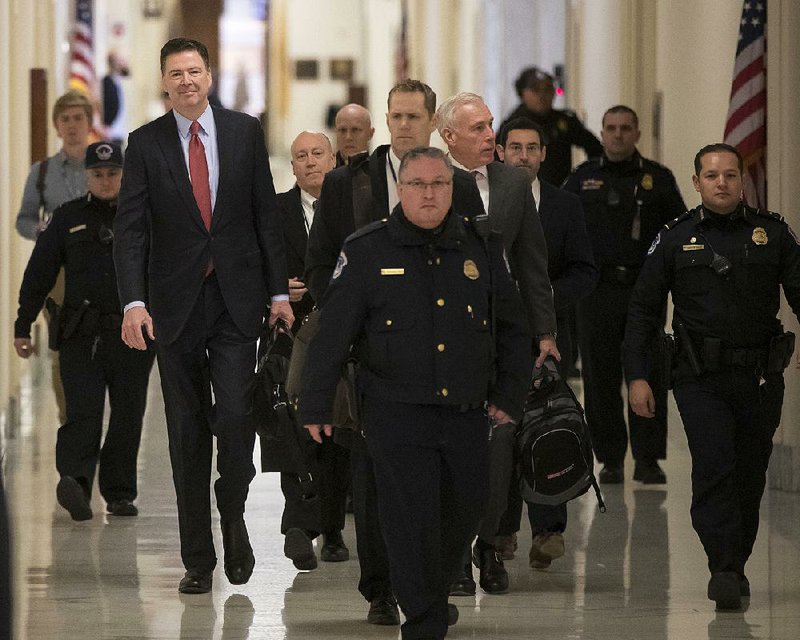WASHINGTON -- Former FBI director James Comey on Monday accused President Donald Trump of trying "to burn down the entire FBI" and argued that congressional Republicans were willing accomplices for failing to challenge him.
"The FBI's reputation has taken a big hit because the president with his acolytes has lied about it constantly," Comey told reporters, after his second private interview this month with House lawmakers running a politically divisive investigation into how federal law enforcement officials handled probes into the Trump campaign's possible Russia ties and into Hillary Clinton's emails.
But Comey directed his vitriol not just at the GOP members of the House Judiciary and Oversight and Government Reform committees, but at all Republicans -- including retiring GOP lawmakers, such as Sens. Bob Corker, R-Tenn., and Jeff Flake, R-Ariz., who have openly criticized Trump but aren't seeking re-election.
"At some point someone has to stand up and face the fear of Fox News, fear of their base, fear of mean tweets, stand up for the values of this country and not slink away into retirement but stand up and speak the truth," Comey said, without naming names.
Comey testified for nearly six hours Monday, in addition to the six-hour private discussion he had with panel members earlier this month.
During that session, he defended his decisions as FBI director -- such as superseding then-Attorney General Loretta Lynch to declare the Clinton probe closed, and then informing congressional leaders days before the 2016 election that it had been reopened.
Comey reiterated that defense even more strongly Monday, saying he personally was not to blame if the FBI's reputation suffered under his stewardship. He instead blamed Trump for "lying about the FBI, attacking the FBI and attacking the rule of law in this country," and the "silence from people in this building" -- meaning Capitol Hill -- that Comey said is allowing Trump to do it.
"Republicans used to understand that the actions of a president matter, the words of a president matter, the rule of law matters and the truth matters," he said. "Where are those Republicans today?"
Republicans on the panel have been in open conflict with Comey about whether he was appropriately forthcoming with his answers, and whether his testimony contradicted former statements he has made.
According to a transcript of the first round of proceedings, Comey declined to answer several questions pertaining to the FBI's probe of Trump, arguing that the details he was being asked to provide were too closely tied to special counsel Robert Mueller's investigation of the Trump campaign's suspected ties to Russia.
Comey also declined to say whether Trump, in firing him last year, had attempted to obstruct justice, although an FBI lawyer present at the interview appeared to confirm that the special counsel was looking into such matters.
Republicans emerged from the first meeting frustrated by Comey's inability or refusal to answer certain questions, and on Monday intimated that Comey was steering clear of topics in similar fashion.
"He's been a consistent witness in the way that he answers questions," Rep. Mark Meadows, R-N.C., said outside the meeting room.
Meadows said Monday that there were inconsistencies between Comey's private testimony and his previous public statements. Democrats emerging from the session, and Comey himself, disputed this assessment. A transcript of the first session suggested that Comey's first private testimony mirrored much of what he has said in public settings.
In between the two interviews with House panels, Comey said at an event in New York that if Trump were not president, he would be "in serious jeopardy of being charged" by New York prosecutors in a case concerning payments made to silence women who alleged affairs with him years ago.
Trump's longtime lawyer and fixer Michael Cohen was sentenced Wednesday to three years in prison for those and other matters that U.S. District Judge William H. Pauley III called a "veritable smorgasbord of criminal conduct."
Comey is one of the last people the joint House panel is expected to question in the probe, which is expected to end -- or change in character -- once Democrats take over the House majority next year. Democrats have accused the GOP of using the investigation to try to discredit the FBI and Justice Department as a means of undermining Mueller's probe.
"They seem to be wanting to play defense counsel for the president," said Rep. Elijah Cummings, D-Md., who is currently ranking member of the Oversight committee and is expected to serve as its chairman next year.
On Monday, Oversight committee member Rep. William Lacy Clay Jr., D-Mo., said the interview was "the last gasp of the Republican majority in this House, to paint this narrative to protect the Trump administration and the Trump campaign."
"And they really don't have a leg to stand on," Clay added.
The joint panel is also expected to interview Lynch privately on Wednesday. No other interviews have been announced.
A Section on 12/18/2018
